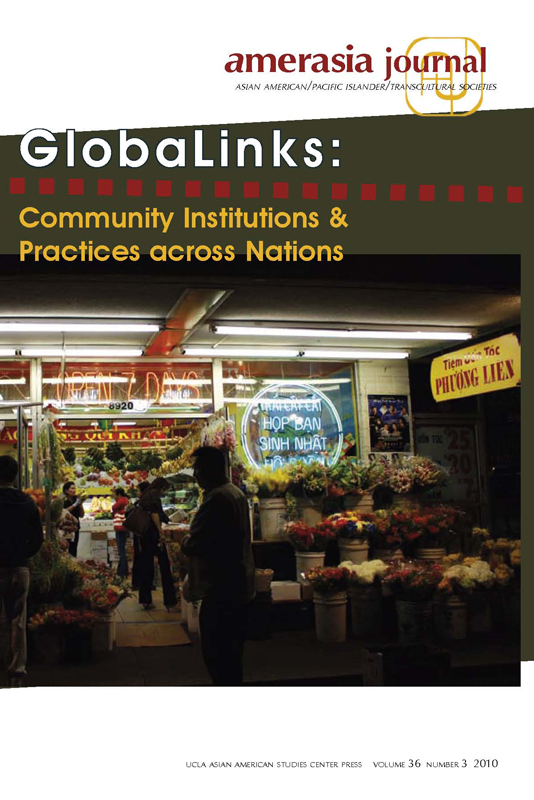Amerasia 36.3
GlobaLinks: Community Institutions & Practices across Nations
Los Angeles — The UCLA Asian American Studies Center Press announces the publication of Amerasia Journal’s latest issue, “GlobaLinks: Community Institutions & Practices across Nations.” Guest edited by Michel Laguerre and Joe Chung Fong, both of the Berkeley Center for Globalization and Information Technology, the special issue brings together research on globalized diasporic communities in the U.S. and Asia from scholars based throughout the Pacific Rim. The contributions to “GlobaLinks” provide new insights on Asian American spaces and places from a wide array of intellectual perspectives, including history, cultural anthropology, urban studies, sociology, ethnic studies, and political science.
“GlobaLinks” recognizes that Asian and Pacific American communities are no longer limited by their institutional identities within local boundaries or defined by their political, cultural, or economic activities within national borders alone. Amerasia has worked with our guest editors to put together a selection of studies which examine social phenomena such as the self-political identity of communities, trans-Pacific youth, banking, voting and political campaigns, and community cultural development. At a conceptual and theoretical level, “GlobaLinks” urges scholars to rethink and reconsider what key terms such as “globalization” and “transnationalism” mean in light of rapidly changing Asian and Pacific American communities. In his introductory essay, for instance, Michel Laguerre coins the term “cosmonation” to make the case that the global and the local are mutually implicated in a complex network of relationships that is not “top-down” or hierarchical as a nation-oriented model of homeland and hostland is.
More information on “GlobaLinks” below the fold…
A number of the articles present thorough historical studies and painstaking fieldwork in local communities to explain how they are connected to larger global frameworks. Through a detailed account of the original Little Saigon in Orange County, Christian Collet and Hiroko Furuya focus on the lived and imagined spaces of Little Saigons to reveal how these local diasporic sites have transformed conceptions of ethnic identity and nation. Shenglin Elijah Chang and Willow Lung Amam use the neologism “glocal” to address the global experiences and local placemaking that transnational Taiwanese youth participate in on both sides of the Pacific, in Silicon Valley and the hi-tech suburb of Hsinchu in Taiwan. Elaborating on the relationship between economic matters of community development and ethnic cultural practices, Eric Estuar Reyes explores the cultural formations and spatial conceptions of Filipino American community in southern California.
Other selections describe how local immigrant communities must negotiate larger social structures, be they economic or local. Banking, for instance, is a particularly fruitful field of investigation for Joe Chung Fong, since it reflects the dynamics of global capital flows as well as the cultural practices of overseas ethnic populations at the local level of the neighborhood. James S. Lai brings politics front-and-center to the global-local concerns of Asian American Studies, focusing on Chinese American political strategies in two suburbs—Cupertino in Silicon Valley and Sugar Land in the Houston area—with populations that are transnational, multiethnic, and multiracial.
In addition, the issue features a tribute by Tritia Toyota to former UCLA Asian American Studies Center Director Lucie Cheng, a pioneering figure in transnational approaches to the field, and a commentary by Vinay Lal on the nuclear age and its global and individual scales. Film and book reviews discuss cultural representations of transnational Asian American experiences, including Lane Ryo Hirabayashi’s review of Shinpei Takeda’s documentary El México Más Cercano a Japon, Jinqi Ling’s review of Karen Tei Yamashita’s award-winning novel I Hotel, and Roshni Rustomji’s review of Saleem Peeradina’s poetry in Slow Dance. Together, the pieces collected in “GlobaLinks” challenge our thinking about the global and local in Asian American Studies.
This issue of Amerasia Journal costs $15.00 plus $5.00 for shipping and handling and 9.25 percent sales tax for California residents ($21.39). Make checks payable to “Regents of U.C.” VISA, MASTERCARD, and DISCOVER are also accepted; include expiration date and phone number on correspondence. The mailing address is: UCLA Asian American Studies Center Press, 3230 Campbell Hall, UCLA, Los Angeles, CA 90095-1546.
Phone: 310-825-2968
Email: aascpress@aasc.ucla.edu
Blog: http://www.amerasiajournal.org/blog/
Annual subscriptions for Amerasia Journal are $99.99 for individuals and $445.00 for libraries and other institutions. The institutional price includes access to the Amerasia online database, which has full-text versions of all Amerasia Journal issues published since 1971. Amerasia Journal is published three times a year: Winter, Spring, and Fall.


 Amerasia on Facebook!
Amerasia on Facebook!